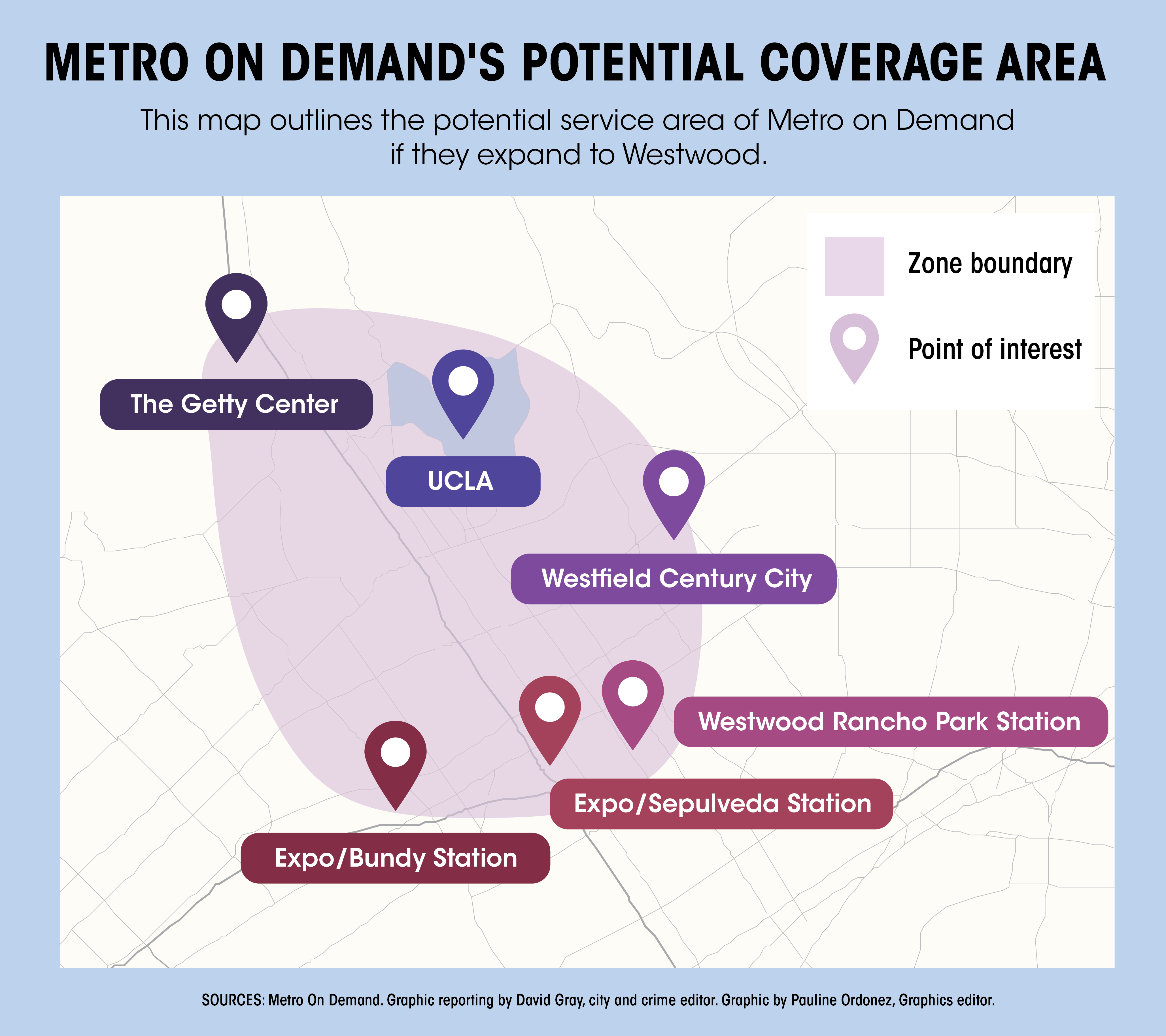LA Metro may introduce alternative ride-sharing service to Westwood

By Stephen Wyer
Dec. 2, 2018 10:41 p.m.
This post was updated Dec. 4 at 10:31 a.m.
A new transportation service through LA Metro may allow people to schedule on-demand car rides in Westwood.
Metro on Demand, also known as MicroTransit, is a pilot project LA Metro is developing to provide car transportation at the beginning and end of trips taken on public transportation. Metro plans to implement the program in Westwood and around two dozen other areas in Los Angeles County, and is currently surveying those areas.
Riders would be able to use an app or contact a call center to schedule a vehicle to pick them up to travel anywhere in Westwood. Trips have to be under 20 minutes, and passengers will ride together during their trip, according to Metro’s website.
Brian Haas, the Metro communications manager, said that while the goal is to provide an affordable form of transportation, Metro has not calculated specific rate fares yet because it is still researching how riders would use the service. Haas added that Metro is currently working on the design phase of the project with three private partners — Via, RideCo and Transdev.
Rani Narula-Woods, Metro’s senior director of special projects, said Metro wants to improve transportation options for riders at the beginning and end of trips to help them get from a transit station to their final destination.
“We’re focused on improving those first last-mile connections,” Narula-Woods said. “We’re working on assisting those with limited access to specific metro stations.”
While passengers can take rides through Metro on Demand to anywhere and not just to transit stations, Narula-Woods said Metro is more interested in seeing the effect of this program on other Metro services.
“We’re trying to understand how this service will impact the market for Metro ridership,” she said.
Narula-Woods said Metro on Demand is similar to Mobility on Demand, which is another collaboration between Metro and private partners recently implemented in North Hollywood, El Monte and Artesia. Mobility on Demand is a national program funded by the Federal Transit Administration with 11 pilot programs around the country, including one in LA Metro.
Michael Manville, an associate urban planning professor, said Mobility on Demand could help people with lower incomes to access Metro stations more easily.
“This program could fill the gap with people who struggle to afford Uber and Lyft. Those who ride with Metro tend to be lower-income individuals,” Manville said. “Additionally, many don’t even have a smartphone or credit card.
A study published by the UCLA Institute of Transportation Studies in January 2018 documented a steep decline in bus and rail ridership from 2012 to 2016. The study cited increased car ownership as the main factor in the decline but also suggested that transportation network companies like Uber and Lyft may play a role in decreased Metro ridership.
Narula-Woods said while this program could affect revenues for transportation network companies, the primary goal of the program is to address declining ridership on Metro services.
“What we’re doing is encouraging people to ride the Metro more often by leveraging emerging technology,” Narula-Woods said. “It’s important to remember that public transit has been around much longer than (transportation network companies).”
Uber did not respond to comment in time for this article.
Some UCLA students said they would use Metro on Demand instead of Uber or Lyft if it was less expensive and more convenient.
Elisa Evans, a third-year psychology student, said she would use the service if it were cheaper than ride-sharing services but added she thinks many commuters may still prefer Uber or Lyft.
“The commuter friends I have would likely keep using Uber and Lyft since they’ve proven reliable and everyone’s familiar with those services,” she added.
Numair Baseer, a fourth-year mathematics and computer science student, said he already knows other ride-sharing companies and wouldn’t use the service unless it was much more reliable.
“People are already using Uber and Lyft so we’re inclined to trust what we know,” said Baseer.
MicroTransit will be implemented towards the end of 2019 if the Metro board approves of the design phase currently in progress, Haas said.

